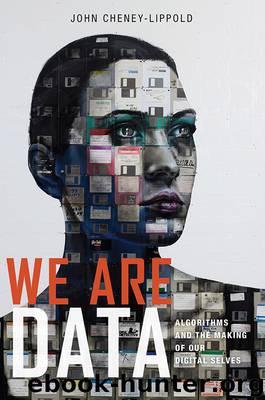We Are Data: Algorithms and the Making of Our Digital Selves by John Cheney-Lippold

Author:John Cheney-Lippold
Language: eng
Format: epub
Tags: COM087000 Computers / Digital Media / General, Business & Economics, Industries, Social Science, Media Studies, Media & Communications
Publisher: NYU Press
Published: 2017-05-02T00:00:00+00:00
On Algorithmic Interpolation
The political act of making subject is famously, and rather overreliantly, described in philosopher Louis Althusser’s allegory of ideological interpellation. A cop yells, “Hey, you!” and “hails” an individual. Like a frog to a prince, that individual turns into a subject, even before she hears “you,” via the ideological apparatuses of the dominant class.46 But requisite in this communicative diagram is the act of self-recognition—a becoming subject in response to the act of the other. While we may theoretically acknowledge our algorithmic identities, jus algoritmi’s black-boxed opacity means we won’t immediately encounter the hail of ‘citizenship.’
Yet algorithmic identifications like jus algoritmi rarely hail users directly. They instead structure users’ conditions of possibilities, be it their access to privacy rights, social relations, or knowledge itself. In this way, the process of making subject is indirect. It is a relation of power more akin to the psychoanalytical framework of theorist Jacques Lacan—which, as it happens, fundamentally influenced Althusser’s theory—than to the metaphorical potency of some overly salutational police officer.
In initial theorizations of Lacan’s “mirror stage,” he proposed that infants become unified individuals upon recognition of themselves as an object in a mirror and thus begin to identify themselves with their own image.47 Or, as author Curtis White summarizes, “‘I’ looks into the mirror and says, ‘I am that.’”48 But Lacan soon expanded this stage into a more general interpretation of subjectivity: subject formation also occurs through our encounters with what he calls an “introjection” of language, or the internalization of symbolic identification.49
More relevant to this chapter, information scholar Ronald Day broadens introjection’s definition to “the mental coding of the subject by cultural forms and social norms, forming unconscious systems of semantic forms and of rules and roles for expression.”50 The process of subjectification may not route through a direct heeding to power. It rather structures and mediates life (from language to culture and to social norms) by constantly retouching our own subjective positioning (of how language, culture, and social norms necessarily change).
For example, we can look to Day’s own work on what he calls the “documentary subject.” This emergent subject relation positions individuals within a field of documents “about something or someone, some object or some person.” “Wanting to know about, in a documentary sense,” Day continues, “is wanting to understand something or someone within a context of a system of knowledge.”51 This focus on “aboutness” is helpful on many counts, not least of which is how Day wordplays a connection between Althusser’s “interpellation” and the statistical method of “interpolation.”52
In an interpolative method, new data points are generated using patterns of existing data points (like predicting future behaviors on the basis of an existing data set). An interpolated subject, then, is not identified according to a preexisting, one-to-one relationship of one’s self. Rather, that subject is understood in the context of statistical estimation that fills in the holes of existing data with new algorithmic approximation. Like Day’s documentary subject, an interpolated subject is only talked about, not to. Ultimately, this
Download
This site does not store any files on its server. We only index and link to content provided by other sites. Please contact the content providers to delete copyright contents if any and email us, we'll remove relevant links or contents immediately.
Cecilia; Or, Memoirs of an Heiress — Volume 1 by Fanny Burney(31324)
Cecilia; Or, Memoirs of an Heiress — Volume 3 by Fanny Burney(30928)
Cecilia; Or, Memoirs of an Heiress — Volume 2 by Fanny Burney(30885)
The Great Music City by Andrea Baker(21195)
We're Going to Need More Wine by Gabrielle Union(18066)
Bombshells: Glamour Girls of a Lifetime by Sullivan Steve(13101)
Pimp by Iceberg Slim(12923)
All the Missing Girls by Megan Miranda(12740)
Fifty Shades Freed by E L James(12443)
Norse Mythology by Gaiman Neil(11875)
Talking to Strangers by Malcolm Gladwell(11863)
Crazy Rich Asians by Kevin Kwan(8342)
Mindhunter: Inside the FBI's Elite Serial Crime Unit by John E. Douglas & Mark Olshaker(7829)
The Lost Art of Listening by Michael P. Nichols(6464)
Enlightenment Now: The Case for Reason, Science, Humanism, and Progress by Steven Pinker(6403)
Bad Blood by John Carreyrou(5762)
The Four Agreements by Don Miguel Ruiz(5502)
Weapons of Math Destruction by Cathy O'Neil(5031)
We Need to Talk by Celeste Headlee(4862)
